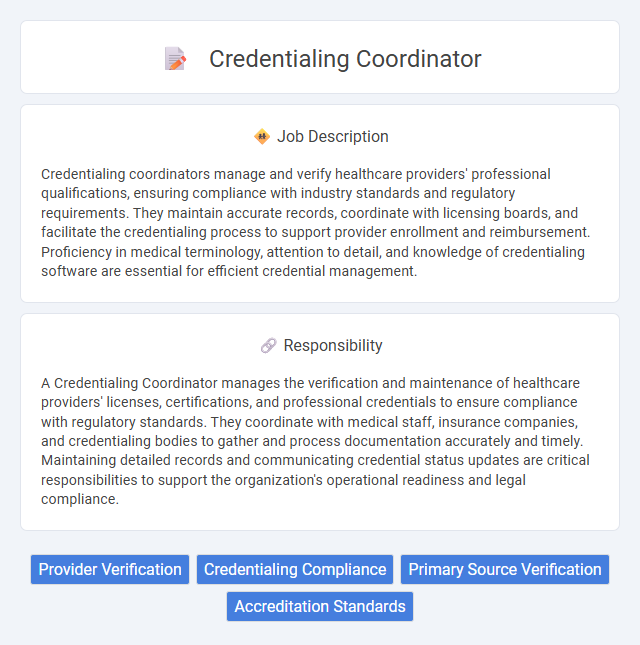
Credentialing coordinators manage and verify healthcare providers' professional qualifications, ensuring compliance with industry standards and regulatory requirements. They maintain accurate records, coordinate with licensing boards, and facilitate the credentialing process to support provider enrollment and reimbursement. Proficiency in medical terminology, attention to detail, and knowledge of credentialing software are essential for efficient credential management.
Individuals who are detail-oriented and possess strong organizational skills are likely suitable for the role of a credentialing coordinator, as the job requires managing and verifying professional credentials meticulously. Those who prefer structured, routine tasks and have good communication abilities may find this position aligns well with their strengths. However, candidates who dislike repetitive administrative work or struggle with high levels of accuracy and compliance might find this role challenging to sustain.
Qualification
Credentialing coordinators require strong organizational skills and attention to detail to manage provider documentation and compliance efficiently. A bachelor's degree in healthcare administration, business, or a related field is often preferred, alongside experience with credentialing software and understanding of regulatory standards such as NCQA and CAQH. Certification through bodies like the National Association Medical Staff Services (NAMSS) enhances professional credentials and demonstrates expertise in verifying healthcare provider qualifications.
Responsibility
A Credentialing Coordinator manages the verification and maintenance of healthcare providers' licenses, certifications, and professional credentials to ensure compliance with regulatory standards. They coordinate with medical staff, insurance companies, and credentialing bodies to gather and process documentation accurately and timely. Maintaining detailed records and communicating credential status updates are critical responsibilities to support the organization's operational readiness and legal compliance.
Benefit
A Credentialing Coordinator likely enhances organizational efficiency by managing the verification of professional qualifications, reducing the risk of compliance issues. They probably improve patient safety and trust by ensuring all healthcare providers meet required standards. This role may also streamline administrative processes, leading to cost savings and better resource allocation.
Challenge
Credentialing coordinators likely face challenges managing extensive documentation and ensuring timely verification of professionals' qualifications. The probability of encountering complex regulatory requirements and frequent updates may complicate maintaining accurate records. Navigating communication between healthcare providers and credentialing bodies could add difficulty in meeting strict compliance deadlines.
Career Advancement
A Credentialing Coordinator plays a crucial role in managing healthcare provider credentials, ensuring compliance with regulatory standards and maintaining accurate records. Mastery in credentialing processes paves the way for career advancement into healthcare administration, compliance management, or medical staff coordination roles. Professional certifications such as Certified Provider Credentialing Specialist (CPCS) enhance qualifications and open opportunities for leadership positions within healthcare organizations.
Key Terms
Provider Verification
A Credentialing Coordinator specializing in Provider Verification ensures healthcare professionals meet all regulatory and organizational standards by thoroughly validating licenses, certifications, and work history. This role involves managing credentialing databases, verifying information with primary sources, and coordinating with providers to maintain up-to-date compliance documentation. Accurate provider verification mitigates risks, supports network integrity, and facilitates timely credentialing decisions.
Credentialing Compliance
A Credentialing Coordinator ensures healthcare providers meet all credentialing compliance standards by verifying licenses, certifications, and professional qualifications. This role involves maintaining accurate documentation, managing credentialing applications, and coordinating with regulatory bodies to uphold accreditation requirements. Effective credentialing compliance mitigates risk, supports reimbursement processes, and promotes patient safety within healthcare organizations.
Primary Source Verification
A Credentialing Coordinator manages the Primary Source Verification (PSV) process by authenticating healthcare providers' licenses, certifications, and education directly from original issuing organizations. Expertise in verifying data from medical boards, educational institutions, and certification bodies ensures compliance with regulatory standards and reduces risk of fraud. Efficient handling of PSV supports accurate provider credentialing, improving healthcare facility trust and patient safety.
Accreditation Standards
Credentialing coordinators ensure healthcare providers meet rigorous accreditation standards by systematically verifying licenses, certifications, and credentials. Their role involves maintaining compliance with regulatory bodies such as The Joint Commission, NCQA, and CMS, which enforce strict quality and safety criteria. Accurate documentation and timely updates are critical to support facility accreditation and uphold patient care excellence.
 kuljobs.com
kuljobs.com